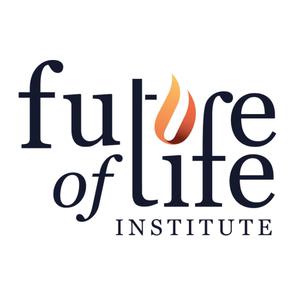
Future of Life Institute Podcast
Future of Life Institute
The Future of Life Institute (FLI) is a nonprofit working to reduce global catastrophic and existential risk from powerful technologies. In particular, FLI focuses on risks from artificial intelligence (AI), biotechnology, nuclear weapons and climate change. The Institute's work is made up of three main strands: grantmaking for risk reduction, educational outreach, and advocacy within the United Nations, US government and European Union institutions. FLI has become one of the world's leading voices on the governance of AI having created one of the earliest and most influential sets of governance principles: the Asilomar AI Principles.
- 1 hour 9 minutesNick Allardice on Using AI to Optimize Cash Transfers and Predict Disasters
Nick Allardice joins the podcast to discuss how GiveDirectly uses AI to target cash transfers and predict natural disasters. Learn more about Nick's work here: https://www.nickallardice.com
Timestamps:
00:00 What is GiveDirectly?
15:04 AI for targeting cash transfers
29:39 AI for predicting natural disasters
46:04 How scalable is GiveDirectly's AI approach?
58:10 Decentralized vs. centralized data collection
1:04:30 Dream scenario for GiveDirectly
19 December 2024, 7:47 pm - 3 hours 20 minutesNathan Labenz on the State of AI and Progress since GPT-4
Nathan Labenz joins the podcast to provide a comprehensive overview of AI progress since the release of GPT-4.
You can find Nathan's podcast here: https://www.cognitiverevolution.ai
Timestamps:
00:00 AI progress since GPT-4
10:50 Multimodality
19:06 Low-cost models
27:58 Coding versus medicine/law
36:09 AI agents
45:29 How much are people using AI?
53:39 Open source
01:15:22 AI industry analysis
01:29:27 Are some AI models kept internal?
01:41:00 Money is not the limiting factor in AI
01:59:43 AI and biology
02:08:42 Robotics and self-driving
02:24:14 Inference-time compute
02:31:56 AI governance
02:36:29 Big-picture overview of AI progress and safety
5 December 2024, 3:00 pm - 1 hour 58 minutesConnor Leahy on Why Humanity Risks Extinction from AGI
Connor Leahy joins the podcast to discuss the motivations of AGI corporations, how modern AI is "grown", the need for a science of intelligence, the effects of AI on work, the radical implications of superintelligence, open-source AI, and what you might be able to do about all of this.
Here's the document we discuss in the episode:
https://www.thecompendium.ai
Timestamps:
00:00 The Compendium
15:25 The motivations of AGI corps
31:17 AI is grown, not written
52:59 A science of intelligence
01:07:50 Jobs, work, and AGI
01:23:19 Superintelligence
01:37:42 Open-source AI
01:45:07 What can we do?
22 November 2024, 2:10 pm - 1 hour 3 minutesSuzy Shepherd on Imagining Superintelligence and "Writing Doom"
Suzy Shepherd joins the podcast to discuss her new short film "Writing Doom", which deals with AI risk. We discuss how to use humor in film, how to write concisely, how filmmaking is evolving, in what ways AI is useful for filmmakers, and how we will find meaning in an increasingly automated world.
Here's Writing Doom: https://www.youtube.com/watch?v=xfMQ7hzyFW4
Timestamps:
00:00 Writing Doom
08:23 Humor in Writing Doom
13:31 Concise writing
18:37 Getting feedback
27:02 Alternative characters
36:31 Popular video formats
46:53 AI in filmmaking
49:52 Meaning in the future
8 November 2024, 3:16 pm - 1 hour 28 minutesAndrea Miotti on a Narrow Path to Safe, Transformative AI
Andrea Miotti joins the podcast to discuss "A Narrow Path" — a roadmap to safe, transformative AI. We talk about our current inability to precisely predict future AI capabilities, the dangers of self-improving and unbounded AI systems, how humanity might coordinate globally to ensure safe AI development, and what a mature science of intelligence would look like.
Here's the document we discuss in the episode:
https://www.narrowpath.co
Timestamps:
00:00 A Narrow Path
06:10 Can we predict future AI capabilities?
11:10 Risks from current AI development
17:56 The benefits of narrow AI
22:30 Against self-improving AI
28:00 Cybersecurity at AI companies
33:55 Unbounded AI
39:31 Global coordination on AI safety
49:43 Monitoring training runs
01:00:20 Benefits of cooperation
01:04:58 A science of intelligence
01:25:36 How you can help
25 October 2024, 12:51 pm - 1 hour 30 minutesTamay Besiroglu on AI in 2030: Scaling, Automation, and AI Agents
Tamay Besiroglu joins the podcast to discuss scaling, AI capabilities in 2030, breakthroughs in AI agents and planning, automating work, the uncertainties of investing in AI, and scaling laws for inference-time compute. Here's the report we discuss in the episode:
https://epochai.org/blog/can-ai-scaling-continue-through-2030
Timestamps:
00:00 How important is scaling?
08:03 How capable will AIs be in 2030?
18:33 AI agents, reasoning, and planning
23:39 Automating coding and mathematics
31:26 Uncertainty about investing in AI
40:34 Gap between investment and returns
45:30 Compute, software and data
51:54 Inference-time compute
01:08:49 Returns to software R&D
01:19:22 Limits to expanding compute
11 October 2024, 11:27 am - 2 hours 8 minutesRyan Greenblatt on AI Control, Timelines, and Slowing Down Around Human-Level AI
Ryan Greenblatt joins the podcast to discuss AI control, timelines, takeoff speeds, misalignment, and slowing down around human-level AI.
You can learn more about Ryan's work here: https://www.redwoodresearch.org/team/ryan-greenblatt
Timestamps:
00:00 AI control
09:35 Challenges to AI control
23:48 AI control as a bridge to alignment
26:54 Policy and coordination for AI safety
29:25 Slowing down around human-level AI
49:14 Scheming and misalignment
01:27:27 AI timelines and takeoff speeds
01:58:15 Human cognition versus AI cognition
27 September 2024, 1:06 pm - 1 hour 19 minutesTom Barnes on How to Build a Resilient World
Tom Barnes joins the podcast to discuss how much the world spends on AI capabilities versus AI safety, how governments can prepare for advanced AI, and how to build a more resilient world.
Tom's report on advanced AI: https://www.founderspledge.com/research/research-and-recommendations-advanced-artificial-intelligence
Timestamps:
00:00 Spending on safety vs capabilities
09:06 Racing dynamics - is the classic story true?
28:15 How are governments preparing for advanced AI?
49:06 US-China dialogues on AI
57:44 Coordination failures
1:04:26 Global resilience
1:13:09 Patient philanthropy
The John von Neumann biography we reference: https://www.penguinrandomhouse.com/books/706577/the-man-from-the-future-by-ananyo-bhattacharya/
12 September 2024, 2:15 pm - 2 hours 16 minutesSamuel Hammond on why AI Progress is Accelerating - and how Governments Should Respond
Samuel Hammond joins the podcast to discuss whether AI progress is slowing down or speeding up, AI agents and reasoning, why superintelligence is an ideological goal, open source AI, how technical change leads to regime change, the economics of advanced AI, and much more.
Our conversation often references this essay by Samuel: https://www.secondbest.ca/p/ninety-five-theses-on-ai
Timestamps:
00:00 Is AI plateauing or accelerating?
06:55 How do we get AI agents?
16:12 Do agency and reasoning emerge?
23:57 Compute thresholds in regulation
28:59 Superintelligence as an ideological goal
37:09 General progress vs superintelligence
44:22 Meta and open source AI
49:09 Technological change and regime change
01:03:06 How will governments react to AI?
01:07:50 Will the US nationalize AGI corporations?
01:17:05 Economics of an intelligence explosion
01:31:38 AI cognition vs human cognition
01:48:03 AI and future religions
01:56:40 Is consciousness functional?
02:05:30 AI and children
22 August 2024, 8:32 am - 1 hour 3 minutesAnousheh Ansari on Innovation Prizes for Space, AI, Quantum Computing, and Carbon Removal
Anousheh Ansari joins the podcast to discuss how innovation prizes can incentivize technical innovation in space, AI, quantum computing, and carbon removal. We discuss the pros and cons of such prizes, where they work best, and how far they can scale. Learn more about Anousheh's work here: https://www.xprize.org/home
Timestamps:
00:00 Innovation prizes at XPRIZE
08:25 Deciding which prizes to create
19:00 Creating new markets
29:51 How far can prizes scale?
35:25 When are prizes successful?
46:06 100M dollar carbon removal prize
54:40 Upcoming prizes
59:52 Anousheh's time in space
9 August 2024, 12:44 pm - 30 minutes 1 secondMary Robinson (Former President of Ireland) on Long-View Leadership
Mary Robinson joins the podcast to discuss long-view leadership, risks from AI and nuclear weapons, prioritizing global problems, how to overcome barriers to international cooperation, and advice to future leaders. Learn more about Robinson's work as Chair of The Elders at https://theelders.org
Timestamps:
00:00 Mary's journey to presidency
05:11 Long-view leadership
06:55 Prioritizing global problems
08:38 Risks from artificial intelligence
11:55 Climate change
15:18 Barriers to global gender equality
16:28 Risk of nuclear war
20:51 Advice to future leaders
22:53 Humor in politics
24:21 Barriers to international cooperation
27:10 Institutions and technological change
25 July 2024, 3:04 pm - More Episodes? Get the App
Your feedback is valuable to us. Should you encounter any bugs, glitches, lack of functionality or other problems, please email us on [email protected] or join Moon.FM Telegram Group where you can talk directly to the dev team who are happy to answer any queries.
 Your Undivided Attention
Your Undivided Attention
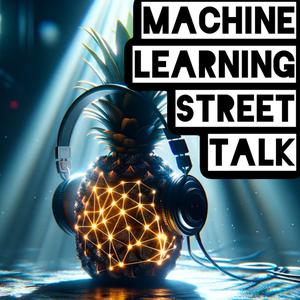 Machine Learning Street Talk (MLST)
Machine Learning Street Talk (MLST)
 Dwarkesh Podcast
Dwarkesh Podcast
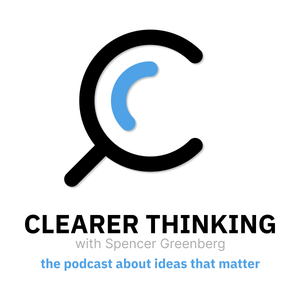 Clearer Thinking with Spencer Greenberg
Clearer Thinking with Spencer Greenberg
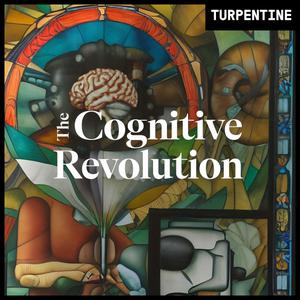 "The Cognitive Revolution" | AI Builders, Researchers, and Live Player Analysis
"The Cognitive Revolution" | AI Builders, Researchers, and Live Player Analysis
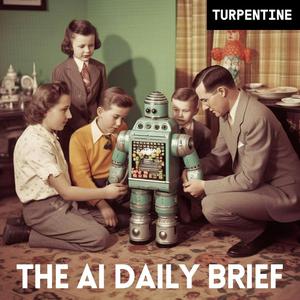 The AI Daily Brief (Formerly The AI Breakdown): Artificial Intelligence News and Analysis
The AI Daily Brief (Formerly The AI Breakdown): Artificial Intelligence News and Analysis